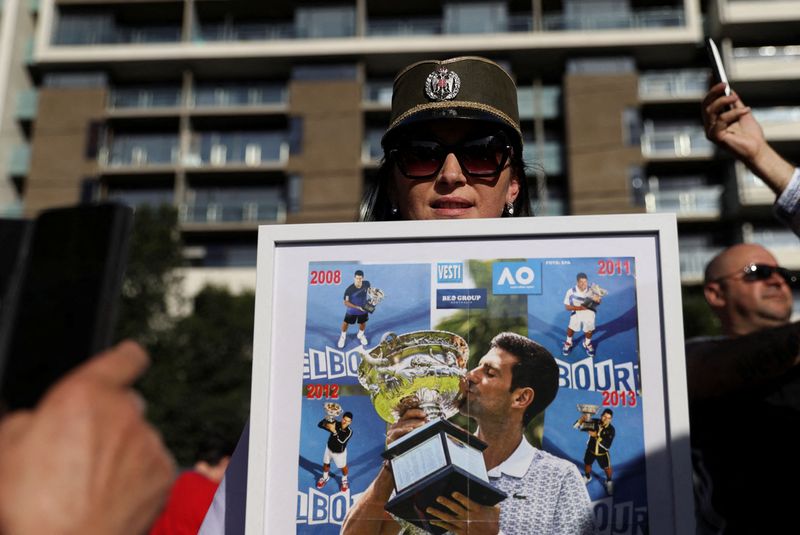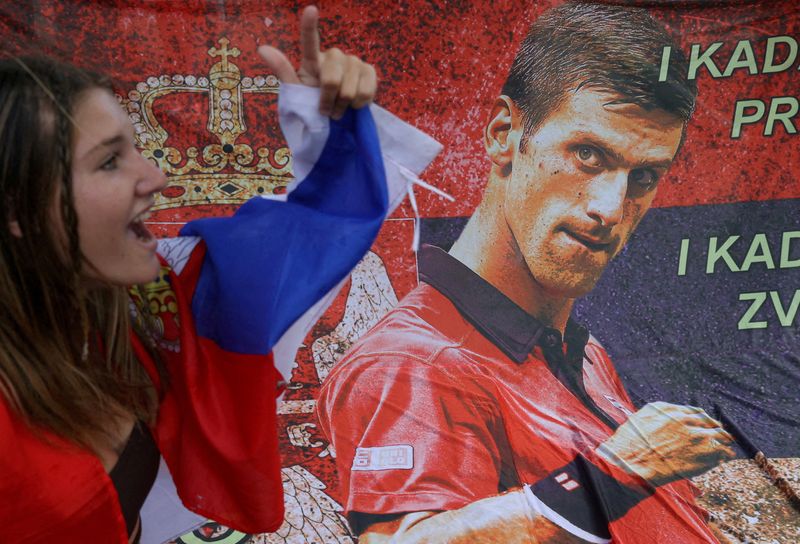By Courtney Walsh and Byron Kaye
MELBOURNE (Reuters) - The Australian government hit back hard at tennis star Novak Djokovic's assertion that he was assured entry with a medical exemption from coronavirus vaccine requirements, pointing out in court papers filed Sunday that no foreigner has a guaranteed right to enter the country.
"There is no such thing as an assurance of entry by a non-citizen into Australia. Rather, there are criteria and conditions for entry, and reasons for refusal or cancellation of a visa," the government said in a filing ahead of a court hearing on the case on Monday.
Djokovic, the world number one, is hoping to win his 21st Grand Slam at the Australian Open, which starts in Melbourne on Jan. 17. But instead of training, the Serbian player has been confined in a hotel used for asylum seekers and is challenging the decision to cancel his visa after being stopped on arrival at Melbourne Airport early on Thursday.
Djokovic, a vocal opponent of COVID-19 vaccine mandates, said in a filing to the court on Saturday that he been granted an exemption from vaccination due to having had the virus in December.
His lawyers said he had the necessary permissions to enter Australia, including an assessment from the Department of Home Affairs that responses on his travel declaration form indicated he met the conditions for quarantine-free arrival. The government disputed this.
It said the department's email was not an assurance "that his so-called 'medical exemption' would be accepted", and his responses could be questioned and verified on his arrival.
The government also challenged Djokovic's claim for a medical exemption on the basis he had contracted COVID-19 in mid-December and had recovered two weeks later.
"There is no suggestion that the applicant had "acute major medical illness" in December 2021. All he has said is that he tested positive for COVID-19. This is not the same," the filing said.
French newspaper L'Equipe published a photograph of the player taken when he was named the daily's Champion of Champions in the days after he said in the court filing he had tested positive for coronavirus, Dec. 16. Other photographs published on social media showed him appearing at functions in Serbia on dates soon after that test.
It was not clear if Djokovic knew of his positive test at the time of the events shown in the pictures.
Djokovic, 34, has won the Australian Open nine times and the drama over his refused entry has caused a furore in sporting circles, sparked tensions between Serbia and Australia and become a flashpoint for opponents of vaccine mandates around the world.
Djokovic's lawyers will have up to two hours to present their case from 10 a.m. (2300 GMT on Sunday) on Monday, while the government department gets two hours to present its defence from 3 p.m. The case is being heard by the Federal Circuit and Family Court.
WORLD NO. 1 IS A NON-CITIZEN
The government filing on Sunday stressed that even if the court ruled to free Djokovic from detention and let him play in the Open, under Australian law the government had every right to detain him again and remove him from the country because he is a non-citizen.
That drew particular ire from Djokovic's father, who addressed another small protest in front of Serbia's parliament building in Belgrade on Sunday.
"The politicians are now saying that even if the court decided that he can play, they can detain him again under their laws," Srdjan Djokovic said.
"Are we animals? What are we? We're human beings. This is happening because we are just a small part of the world, but we are proud. They have no respect for him."
Australia says its health department notified tournament organising body Tennis Australia in November that a recent COVID-19 infection was not necessarily grounds for exemption in the country, as it is elsewhere. However, Djokovic's lawsuit says the Department of Home Affairs wrote to him this month to say he had satisfied the requirements to enter the country.
TENNIS AUSTRALIA
Tennis Australia CEO Craig Tiley said in his first media interview since the furore began that his organisation had spoken with federal and state officials for months to ensure the safe passage of players.
"Primarily because there is (so) much contradictory information the whole time, every single week we were talking to Home Affairs, we were talking to all parts of government to ensure that ... we were doing the right thing and (following) the right process with these exemptions," Tiley told Channel Nine television.
"The conflicting information, and the contradictory information we received, was because of the changing environment. We are in a challenging environment."
Finance Minister Simon Birmingham, asked about the matter on Channel 9 television, said without referring directly to Djokovic that "there's a clear difference between visas and entry requirements" and "entry requirements ... sit over and above the visa conditions".

Czech player Renata Voracova, who was detained in the same detention hotel as Djokovic and had her visa revoked after issues with her vaccine exemption, left the country without challenging her status, the Czech Foreign Ministry said.
Djokovic has drawn strong support at home. Serbian Prime Minister Ana Brnabic said on Saturday that he had been given gluten-free food, tools to exercise and a SIM card to stay in contact with the outside world.
